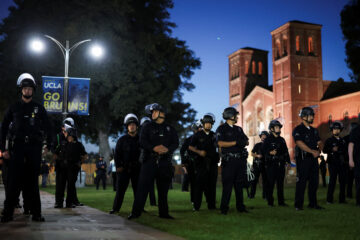Paris attacker was French army reject
Foued Mohamed-Aggad, one of three young men who shot dead 90 people at a Paris concert hall a month ago, was turned down by the French army and possibly also by the police before Islamic State took him on to fight for them.
Army recruiters in the eastern city of Strasbourg decided after conducting physical and psychological tests that he was not a suitable candidate to bear arms as a French soldier.
Mohamed-Aggad\’s identity was only established this week because of a text message his mother Fatima received.
The text came from his wife, Hadjira, in Syria. It told the mother of four that her younger son had died "with his brothers" on Nov. 13, the night of the attacks.
Fearing the worst, and with her elder son already in prison on suspicion of having terrorism links, the Moroccan-born woman went to the family\’s lawyer.
DNA matching followed, and the profile of yet another radicalized young man, from yet another part of France, emerged this week, joining other home-grown French and Belgian jihadis already identified as the killers of 130 victims at the Bataclan concert hall and elsewhere in Paris.
Mohamed-Aggad had set off for Syria in 2013, and while his departure was no secret in his small home town of Wissembourg in northeastern France, some who knew him were shocked to learn of his role in the Paris killings.
"I can\’t believe it was him," said Yazar Mesut, a 46-year-old neighbor told Reuters in one of the town\’s bars. "He was intelligent and polite, knew what respect was about and didn\’t act like a big shot."
According to another neighbor, who gave his name as Youssef, the young man failed the police entrance exam by just a few marks, and was also turned down by the army.
"That\’s the only time I saw him disappointed. He was complaining. He reckoned it was because of his foreign origins," said Youssef.
An official from Strasbourg\’s army recruitment office confirmed that Mohamed-Aggad had tried and failed to join up in 2010.
"We have filters. We look at personality and do physical and psychological tests. The candidate has to be healthy and viable for the army," said army recruitment spokeswoman Lieutenant Colonel Sophie Caussel.
"In this case we identified him as not suitable as a soldier and to bear arms. We decided not to go any further with him."
Most would-be soldiers in France are in fact disappointed. Only 15,000 people will be recruited to the French army this year out of 160,000 applicants so far, according to official figures, which recorded a big jump in applications after the Nov. 13 attacks.
Police recruitment authorities would neither confirm nor deny any application. An official cited the confidentiality requirements of the inquiry into the Nov. 13 killings as the reason for the secrecy.
Either way, Mohamed-Aggad, who was 23 when he died, had left his military and police ambitions far behind him.
According to the judicial source he was also being investigated for links to Mourad Fares, a Franco-Moroccan man suspected of being a key jihadist recruiter for Syria in Toulouse and Strasbourg, and who is already in jail in France after being arrested in Turkey last year.
Christian Mahler shared a floor in the small residential building near Wissembourg station where Mohamed-Aggad\’s family lived for a time, and where they stood out among most residents who were of European descent.
Mohamed-Aggad began frequenting the Mosque more often around 2012, according to other people in the bar.
During that period, according to Mahler, Mohamed-Aggad\’s mother often found herself apologizing to neighbors for the noise made by her children, who used to bang on the walls of their apartment.
Can Yakup, president of a Turkish cultural center that he said Mohamed-Aggad visited "once or twice", thinks he was a witness to a change in the young man\’s behavior.
"The last time I sent him away because he wanted to pray on his own," Yakup told Reuters at the center which sits behind a railway line and next to a Lidl supermarket. "It was like for him the rest of us weren\’t good enough Muslims."
According to police sources and locals, Mohamed-Aggad and his brother Karim, 25, set off for Syria towards the end of 2013.
Two friends from the Wissembourg and five more young people from Meinau, a suburb of nearby Strasbourg, went with them.
One of the Wissembourg contingent did not get far, intercepted at Frankfurt airport by his parents.
Others came back a few months later in 2014, saying they had been on a humanitarian mission. In May that year, seven were arrested, including Karim. They are still in custody.
Judicial sources say Paris prosecutors asked on Oct. 9 this year for a case to be brought against them on terrorism-related charges that could carry jail sentences of 10 years. They could appear in court in 2016.
Officials have yet to name all the dead gunmen and suicide bombers directly involved in last month\’s attacks, for which Islamic State claimed responsibility. It remains unclear when and how Mohamed-Aggad returned to France.
The other two attackers at the concert hall have been named as Samy Amimour, 28, a former bus driver from Drancy, north east of Paris, and Ismail Omar Mostefai, 29, a Frenchman of Algerian descent who lived for a time in Chartres, south west of Paris.
Amimour also spent time in Syria, as did the presumed ringleader, Abdelhamid Abaaoud, 28, a Belgian of Moroccan origin who died in a police raid the following week.
Brahim Abdeslam, 31, who blew himself up after taking part in the cafe and restaurant killings, was a French citizen too although born and raised in Brussels.
Bilal Hadfi, 20, one of three suicide bombers who died near the Stade de France, dropped out of school in 2014 to travel to Syria. Another of the attackers, Salah Abdeslam, 26, also a Frenchman although born in Brussels, is still on the run.
SOURCE: REUTERS
[do_widget_area inner_adsbar]










